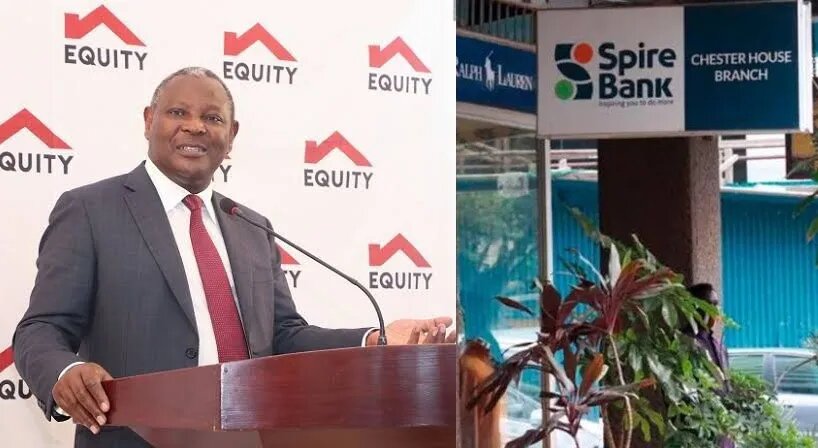Acquisitions
Equity Bank Closes Deal To Acquire Spire Bank

Equity Bank has concluded negotiations to buy Spire Bank, setting the stage for the signing of a deal that is expected to get the teachers-owned bank out of a financial crisis.
The deal will see Mwalimu Sacco, which owns Spire Bank, pay Equity an additional Ksh1.7 billion to cover liabilities.
The top-tier lender will take over just under Ksh900 million in assets and Ksh1.3 billion in liabilities.
The half-a-billion-shilling difference, employee costs, claims and litigations amounting to Ksh1.7 billion will be covered by Mwalimu Sacco.
Equity becomes the latest tier one bank to buy a struggling lender in search of new growth opportunities after KCB, which recently acquired the National Bank of Kenya (NBK).
The Central Bank of Kenya (CBK) has agreed to financially back the deal in a bid to avoid a collapse of the lender and the ensuing banking crisis that saw three banks collapse within months just five years ago.
CBK Governor Patrick Njoroge told MPs he had not yet considered putting the lender under receivership and was hopeful the bank could still recover.
He said receivership was a last resort and carried the risk of deeming the teachers’ savings and credit cooperative society (Sacco) unviable and shareholders in the financial sector locking them out in future from any participation in the sector.
The governor may, however, attract criticism for having denied Spire Bank a similar amount through a long-term loan to recapitalize operations as the lender of last resort.
Spire Bank has been unable to access cash from peer banks due to its financial challenges.
The bank has been begging for additional support from its majority shareholders Mwalimu Sacco and the CBK to allow it to earn money to meet expenses and recover losses.
Mwalimu Sacco CEO Kenneth Odhiambo told MPs early this year Spire Bank had requested funds from the CBK, which refused to give the bank a long-term interest-free loan to recover.
The CBK has been providing short-term liquidity of up to Ksh1.3 billion through Reverse Repo (Repurchase Agreements), which is short-term and not enough to revive the lender.
The teachers have also been constrained by Sacco laws to limit their exposure after they pumped billions of shillings into the bank over the years.
A parliamentary probe revealed that the Sacco Societies Regulatory Authority (Sasra) stopped Mwalimu Sacco from pumping additional money into the bank after they sank billions into lender bought from the late Naushad Merali in 2015 for Ksh2.4 billion.
Mwalimu Sacco has been supporting Spire Bank with funds after the lender accumulated losses of Ksh9 billion, including a Ksh3.4 billion conversion of teachers’ deposits into equity.
The Sacco has admitted the investments in the bank and in real estate created cash flow constraints, prompting the regulator to intervene.
Despite uncertainties on its future, Spire Bank has pursued a turnaround on lower costs, loan recoveries and conversion of shareholder deposits into equity.
The bank cut its half-year net loss by 21 percent to Ksh403 million despite constrained lending due to low capital and delayed resolution through the bank sale or finding a strategic investor.
It reduced losses from Ksh512.8 million in June last year on drastic cost-cutting measures that reduced interest and operational expenditure.
Interest expense declined from Ksh221 million to Ksh85 million on the conversion of Ksh3.4 billion deposits to equity while operating expenses declined 7.0 percent to Ksh470 million.
The teachers’ bank has been unable to lend due to low capital ratios that have seen its loan book shrink from Ksh2.3 billion to Ksh1.7 billion.
The bank whose capital ratios are below the mandatory CBK requirements has, however, seen an improvement in its core capital from negative Ksh4.1 billion in June last year to currently negative Ksh1.7 billion due to the deposit to equity conversion.
The bank has also witnessed a high turnover on its nine-member board that has left some seats unfilled.
Two board members, the former chair David Wachira and Wycliffe Osoro resigned in March while Christine Sabwa left in August last year.







